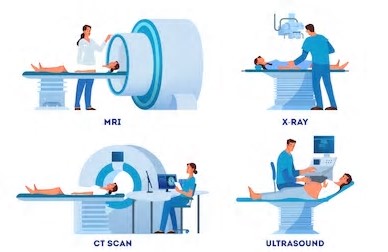- A biopsy when a doctor takes a sample of cells or tissue from the lump or area that looks abnormal.
- An examination under general anaesthetic which will involve a thin tube is passed down the throat to examine it and take a biopsy.
- A CT scan this is a more sophisticated x-ray that takes a 360 degree image of the spine, vertebrae and internal organs.
- A MRI which stands for magnetic resonance imaging and combines a strong magnet with radio waves. The doctor views the images as “slices” or cross-sections of the scanned body part. Unlike x-rays, there’s no radiation involved.
- A nasendoscopy which involves a thin, flexible tube with a light at the end that is passed into the nose and into the throat.
- A PET CT scan helps the physician to see the level of activity of certain body organs and tissues, along with their structure. You’ll receive a substance called a “tracer” containing glucose with a little bit of radioactive material. The tracer will be swallowed, inhaled or injected, depending on the examined body part.
- An ultrasound scan of an affected area, where a biopsy may be taken at the same time.
Head and Neck Cancer Services

Head and neck cancer is a relatively uncommon type of cancer. Around 10,000 new cases are diagnosed in the UK each year.
There are more than 30 areas within the head and neck where cancer can develop, including the:
- mouth and lips
- oral cavity
- voice box (larynx)
- throat (pharynx)
- salivary glands
- nose and sinuses
- area at the back of the nose and mouth (nasopharynx)
Thyroid cancer consists of four main types
- papillary carcinoma
- follicular carcinoma
- medullary thyroid carcinoma
- anaplastic thyroid carcinoma
The Trust has a team of doctors, nurses, allied health professionals, admin, and managerial staff are all dedicated to look after you from diagnosis, through to treatment and long term after-care after treatment for head and neck cancer.
Signs and symptoms
For signs and symptoms related to head and neck cancers please follow the link to the Macmillan website.

Diagnosis, tests and investigations
The first appointment you have will be with the doctor and this involves obtaining a history of your symptoms and general health along with examination.
This can sometimes include a procedure called nasendoscopy (this is a test where a trained member of the team will use a flexible tube with a camera at the end to look at the back of your mouth, nose, pharynx and larynx. It is normally passed down the nose to the area at the back of the mouth). Further tests (biopsy and scans to obtain detailed information about the cancer) are arranged following that appointment. There are various tests that might be required to diagnose head and neck cancer. These may include any of the following:
Watch as comedian & writer Mark Steel talks you through the simple steps of the Help Us Help U method – just 2 minutes of your time can help detect the early signs of head and neck cancer.
For more information on self-check for head and neck cancers please click the link promoted by Oracle Charity.
Treatment
The potential treatment options may include:
- surgery
- radiotherapy
- immunotherapy
- chemotherapy
- symptom management
It may also be a combination of these options, please click here for further information on the types of treatment.
Dietary information
Find dietary and nutritional information provided by the Yorkshire cancer networks on their website.
Support Programmes
Within the West Yorkshire and Harrogate region other Trusts have progranmmes which offer support to patients who may require their services.
Please click on any of the links before for the various Trusts for further information.
First Steps
At Calderdale and Huddersfield NHS Foundation Trust we encourage newly diagnoised patients to join our First Steps programme.
First Steps always starts with a patient sharing the story of their cancer diagnosis and journey. Patients and family members who have attended First Steps say that they find it interesting and encouraging to listen to a patient sharing their story.
For further information please click here which will open First Steps in a new page
Here Rob talks about his own experience, following a diagnosis of head and neck cancer.
